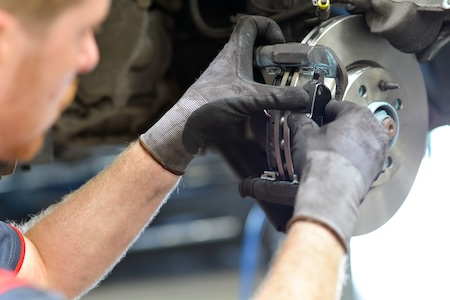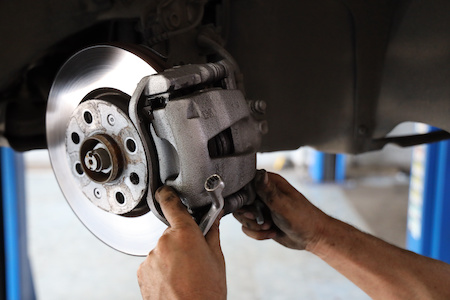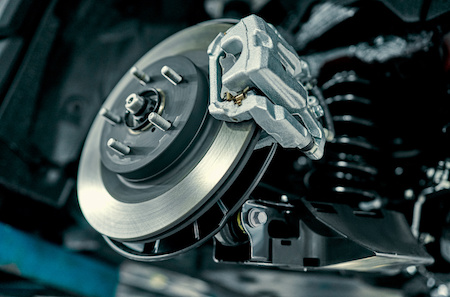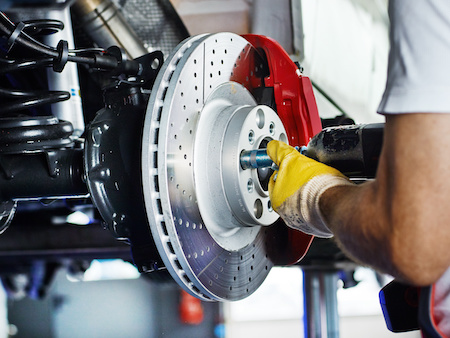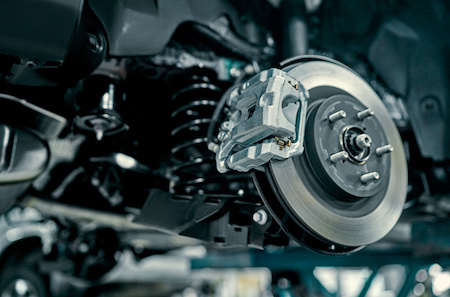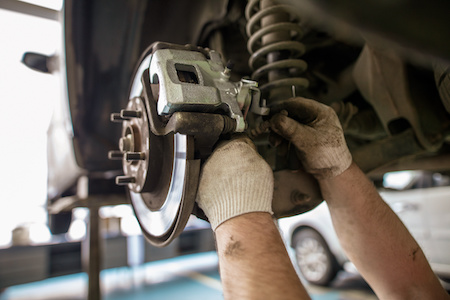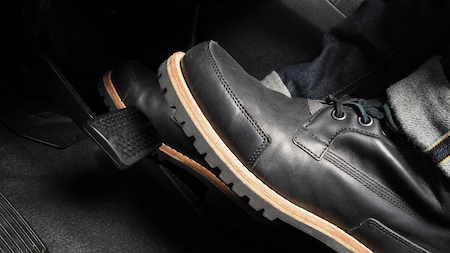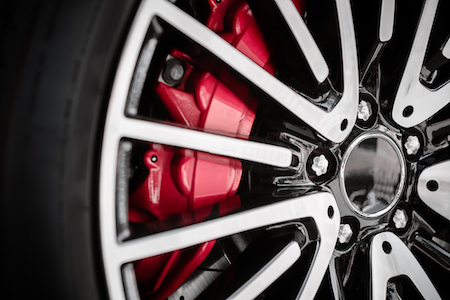There are so many things we rely on in our daily lives.
We rely on our friends to be there when we need a helping hand. We rely on our homes to keep us safe and warm. We rely on good food and water for our survival.
Some things you know and value – you’re grateful for them every day. But what about other things you might take for granted? How about your car?
You hop in every morning, knowing it will get you around town. You turn the key and expect it to work. Until it doesn’t …
What does this have to do with your car’s brake pads? Good question. Brake pads probably aren’t something you think of routinely. They work, and work … until they don’t.
And living here in Colorado, the last place you want your brakes to fail is coming home from a day of skiing, or driving your kids home from school. A lot is riding on your brakes.
Brake Pads – The Simple Version
If you pick up a car magazine, you can get into the nitty-gritty details of what brake pads are and how they fit into the entire brake system. But all you probably care about is that they work.
Without brake pads, your car wouldn’t stop – isn’t that all you really need to know? If you can’t stop, it puts your passengers in danger. If you can’t stop, you might wreck your car, cause injury to yourself and others, and have a lot to deal with in the coming days and weeks.
So you might say your brake pads are your protectors, keeping you safe as you drive. Inside each wheel, there’s a shiny metal disk called a brake rotor. When you step on the brake pedal, you’re sending a message to the brake pads saying, “Time to work!”
The brake pads squeeze tight against the brake rotors, creating friction that slows down the rotation of the wheels. This gives you control to slow down at will, ultimately bringing your car to a stop.
Of course, brake pads are the key to this process. They come in different types, each with its own strengths. Some are designed for durability, while others are crafted for performance. But no matter which type you install, they all have the same job: helping you slow down and stop smoothly and safely whenever needed.
Brake Pad Composition
Your car isn’t a one-size-fits-all product. It’s designed to provide benefits and options depending on what you’re looking for in a vehicle.
Likewise, each vehicle part has numerous options and possibilities. You can select replacement parts based on your goals and desires.
Brake pads may be designed for stopping power, but you have a selection to choose from based on how you drive.
The key ingredient in brake pads is a prediction material that comes in contact with the brake rotor to create friction and slow down the vehicle. This friction material can be:
- Organic – made from materials like rubber, glass, and Kevlar. Organic brake pads are quieter and produce less dust, but typically wear out faster than other materials.
- Semi-metallic – crafted from a mix of metal fibers, like steel. They offer better heat dissipation and durability, but may produce more noise and dust.
- Ceramic – composed of ceramic fibers, bonding agents, and fillers. They provide excellent performance, low noise, and minimal dust. They are the most costly brake pads on the market.
In general, manufacturers design a vehicle with a specific brake pad material in mind. They install a brake pad to meet specific performance, durability, and noise requirements for different vehicles and driving conditions.
How Do You Choose Brake Pads?
Need new brake pads? One of the biggest warning signs is a grinding, squealing noise. You can’t miss it. Worse, you can’t ignore it – it won’t let you. It keeps squealing, getting louder, until you replace your brake pads.
But which brake pads do you choose? Choosing the right brake pads for your vehicle means considering several factors for optimal performance, safety, and durability.
Consider your car. Yes, the best place to start is by referring to your owner’s manual. Your car’s manufacturer built your vehicle; they’ll make recommendations on what they consider to be the best replacement parts when it’s time for repair.
Consider your driving habits. Are you a daily commuter, a weekend warrior, or someone who enjoys spirited driving? Also, consider the typical driving conditions you encounter, such as city streets, highways, or mountainous terrain.
Understand the different types of brake pads. Remember the different types we talked about earlier? Organic, semi-metallic, and ceramic brake pads each have their own braking performance, noise level, dust generation, and longevity characteristics. One of them may be designed more for how you drive your car.
Consider performance requirements. Nobody knows how you drive quite the way you do. If you have specific performance requirements, such as improved stopping power, reduced noise, or better heat dissipation, look for brake pads that meet those needs. This is where working with a trusted mechanic can be beneficial – they’ll help you select the right parts to suit your driving performance. High-performance brake pads may offer better performance but could come with trade-offs like increased noise or wear. They’ll help you decide.
Evaluate longevity and maintenance. What means more to you, durability or performance? Consider how long you expect the brake pads to last and how much maintenance you’re willing to perform. Some brake pads may require more frequent replacement but offer better performance, while others may last longer but sacrifice performance.
Seek professional advice. We’ll say it again: your best course of action is to find a trusted mechanic you can rely on for advice. It makes every repair job a little easier, knowing you’ll receive sound advice.
Which Brake Pad Is For You – Durability or Performance?
So what’s your goal? What do you hope to accomplish? Do you know you need new brake pads, or are you simply upgrading for performance?
You’ve chosen a good place to start. Whether it’s optimizing stopping power, reducing noise and dust, or enhancing longevity, the right combination of materials plays a crucial role in ensuring safe and reliable braking.
Want more help? We can help. Stop by or give us a call today.


